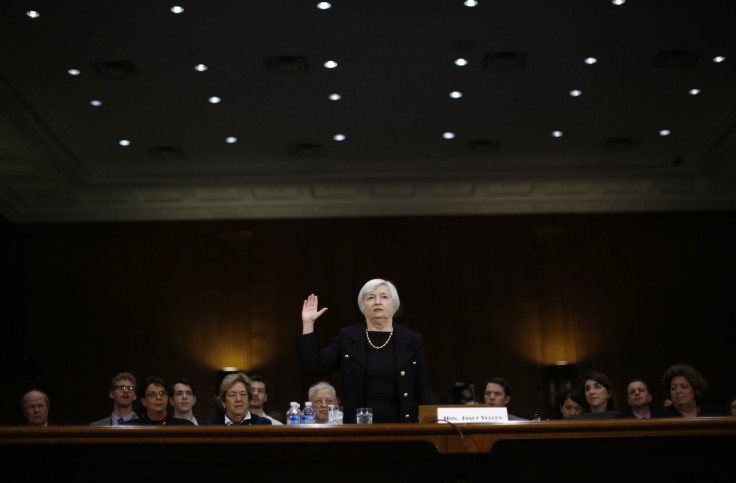Janet Yellen Congress Testimony Live Stream: Fed Chair Warns Of Consequences If Central Bank Waits To Hike Interest Rate

In her testimony before Congress at 10 a.m. Thursday, Federal Reserve Chair Janet Yellen is expected to make the case for a hike in the central bank’s interest rate target next month. A live stream of her statement before the Congressional Joint Economic Committee, along with a question-and-answer session, is available on CSPAN.
In her prepared statement on the U.S.' economic outlook, Yellen cited healthy indicators, such as average job gains of 180,000 per month since January, a low, stable unemployment rate of 4.8 percent and an inflation rate heading toward the Fed’s 2 percent target as signs that a tightening of monetary policy was near. She also warned of the dangers of delaying a rate hike once more—namely, that allowing the economy to grow at a faster rate for an extended period of time would lead to market instability, and could require the Fed to suddenly put on the brakes, potentially causing a negative economic shock.
“Were the FOMC to delay increases in the federal funds rate for too long, it could end up having to tighten policy relatively abruptly to keep the economy from significantly overshooting both of the Committee's longer-run policy goals,” Yellen said, referring to the Federal Open Market Committee (FOMC), which sets the central bank’s monetary policy. “Moreover, holding the federal funds rate at its current level for too long could also encourage excessive risk-taking and ultimately undermine financial stability.”
The Fed decided once again not to raise rates earlier this month. Yellen said the decision showed patience for economic indicators to reach the central bank’s intended figures.
“Waiting for further evidence does not reflect a lack of confidence in the economy,” she said.
The federal funds rate, which is the interest rate at which banks lend to one another in the short term, tends to impact other interest rates across the U.S. economy, such as mortgage rates and bond coupon rates. The Fed uses this monetary policy tool as a way to tame the economy following periods of economic stimulus, during which the central bank deploys lower rates that make borrowing and investment in things like capital and homes less expensive.
The Fed’s current target stands at between 25 and 50 basis points, or between 0.25 and 0.50 percent. More than 90 percent of analysts surveyed by the CME Group expect the FOMC to announce a rate hike to between 50 and 75 basic points after the group’s next meeting, which ends Dec. 14.
After the victory of President-elect Donald Trump on Nov. 8, expectations for an interest rate increase dipped due to uncertainty and market volatility surrounding the candidate. Swaps traders betting on the rate hike dropped their expectations as the likelihood of a Trump win rose, according to Bloomberg, with the market-implied chance of a raise falling to 47 percent on Wednesday from 82 percent at market close Tuesday.
But as the stock market has regained its steady climb following a period of zigzagging in the aftermath of the election, expectations that Trump’s stimulus package—which, according to Trump’s campaign site, is twice that of opponent Hillary Clinton’s infrastructure spending plan—could get the economy humming along have sent expectations back above 80 percent once more.
© Copyright IBTimes 2025. All rights reserved.





















